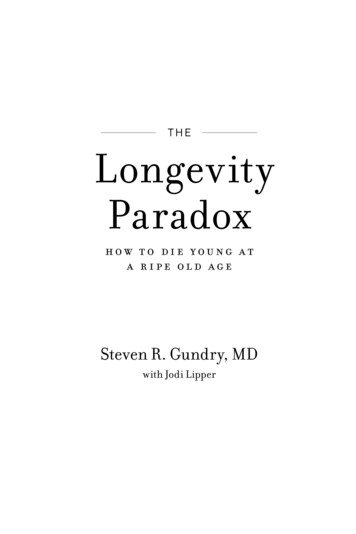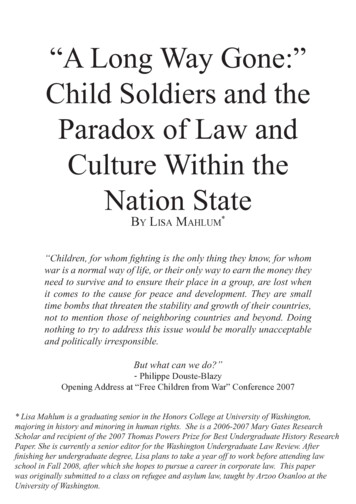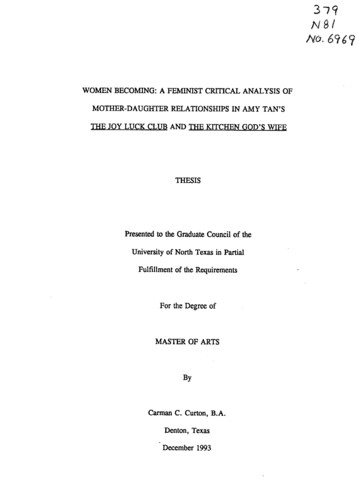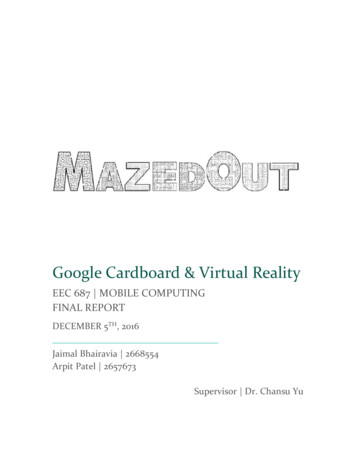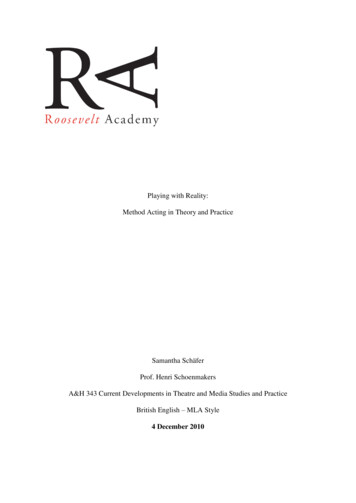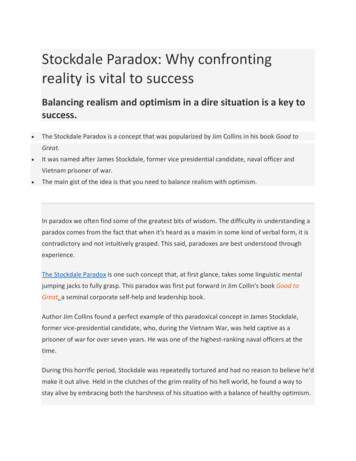
Transcription
Stockdale Paradox: Why confrontingreality is vital to successBalancing realism and optimism in a dire situation is a key tosuccess. The Stockdale Paradox is a concept that was popularized by Jim Collins in his book Good toGreat. It was named after James Stockdale, former vice presidential candidate, naval officer andVietnam prisoner of war. The main gist of the idea is that you need to balance realism with optimism.In paradox we often find some of the greatest bits of wisdom. The difficulty in understanding aparadox comes from the fact that when it's heard as a maxim in some kind of verbal form, it iscontradictory and not intuitively grasped. This said, paradoxes are best understood throughexperience.The Stockdale Paradox is one such concept that, at first glance, takes some linguistic mentaljumping jacks to fully grasp. This paradox was first put forward in Jim Collin's book Good toGreat, a seminal corporate self-help and leadership book.Author Jim Collins found a perfect example of this paradoxical concept in James Stockdale,former vice-presidential candidate, who, during the Vietnam War, was held captive as aprisoner of war for over seven years. He was one of the highest-ranking naval officers at thetime.During this horrific period, Stockdale was repeatedly tortured and had no reason to believe he'dmake it out alive. Held in the clutches of the grim reality of his hell world, he found a way tostay alive by embracing both the harshness of his situation with a balance of healthy optimism.
Stockdale explained this idea as the following: "You must never confuse faith that you willprevail in the end — which you can never afford to lose — with the discipline to confront themost brutal facts of your current reality, whatever they might be."In the most simplest explanation of this paradox, it's the idea of hoping for the best, butacknowledging and preparing for the worst.What is the Stockdale Paradox? After years in captivity, Stockdale eventually home.The ability to acknowledge your situation and balance optimism with realism comes from anunderstanding of the Stockdale Paradox. This contradictory way of thinking was the strengththat led James through those trying years. Such paradoxical thinking, whether you consciouslyknow it or not has been one of the defining philosophies for great leaders making it throughhardship and reaching their goals.
Whether it's weathering through a torturous imprisonment in a POW camp or going throughyour own trials and tribulations, the Stockdale Paradox has merit as a way of thinking andacting for any trying times in a person's life.The inherent contradictory dichotomy in the paradox holds a great lesson for how to achievesuccess and overcome difficult obstacles. It also flies right in the face of unbridled optimists andthose positivity peddlers whose advice pervades nearly every self-help book or guru spiel outthere.In a discussion with Collins for his book, Stockdale speaks about how the optimists fared incamp. The dialogue goes:"Who didn't make it out?""Oh, that's easy," he said. "The optimists.""The optimists? I don't understand," I said, now completely confused,given what he'd said a hundred meters earlier."The optimists. Oh, they were the ones who said, 'We're going to be out byChristmas.' And Christmas would come, and Christmas would go. Thenthey'd say,'We're going to be out by Easter.' And Easter would come, andEaster would go. And then Thanksgiving, and then it would be Christmasagain. And they died of a broken heart."Applying the Stockdale Paradox to your daily lifeWe all want things to workout for ourselves. We want to be successful, happy, and haveachieved something no matter how trivial or personal it may be. Reaching this state ofaccomplishment isn't going to come just by positive visualization. That's all well and good and itmakes us feel nice. It's why so many people like to listen to the endless screeds of "businessgurus" and motivational shysters promising us the world if we only just learned to change ourmindset.Confronting the entire brevity of your situation is instrumental for success. There's a bit ofpositive visualization in there, but it needs to be counterbalanced with the thought that you can
utterly fail and to put it frankly – your current existence might be absolutely miserable andhopeless. But don't lose faith, your wildest dreams just might come true. . . hence the paradox.It's not about choosing which side to take, but instead learning to embrace both feelings inopposition to one another and realize they're necessary and interconnected.Stockdale Paradox in business and hardshipOn a higher level, and when it comes to business leadership and management, this dualityhelps to guard against the onslaught of disappointments that will hit you in the business world.Optimism may drive innovation, but that needs to be put in check to help ensure that you'restill on this plane of reality and not bumbling naively into something that can't happen.It's a great mechanism to keep yourself grounded, but also entertain the idea of beingincredibly successful in whatever pursuit you're after.The Stockdale Paradox can help out an organization assess a current situation and planaccordingly to tackle the challenges they come across. It enforces both the idea that you can bepositive and believe you will overcome all difficulties while at the same time you areconfronting the most brutal facts of your current situation. The latter is what turns people off,because it can be misconstrued as negative or overly pessimistic.Similar ideas to the Stockdale ParadoxYet, we'll find again and again that it is this line of thought that fosters success even in the mostdire and inhumane of situations. Viktor Frankl, psychotherapy and holocaust survivor, wrote inhis book Man's Search for Meaning that prisoners within Nazi concentration camps usually diedaround Christmas time. He believed that they had such a strong hope they'd be out byChristmas that they simply died of hopelessness when that didn't turn out to be true.Here is a passage from his book regarding this thought:The death rate in the week between Christmas, 1944, and New Year's, 1945, increased in campbeyond all previous experience. In his opinion, the explanation for this increase did not lie inthe harder working conditions or the deterioration of our food supplies or a change of wealth
or new epidemics. It was simply that the majority of the prisoners had lived in the naive hopethat they would be home again by Christmas. As the time drew near and there was noencouraging news, the prisoners lost courage and disappointment overcame them. This had adangerous influence on their powers of resistance and a great number of them died.Frankl developed a concept he called "tragic optimism," that is, an optimism in the face oftragedy. This idea has gone through many names and iterations throughout the years. In theNietzschean worldview, it's the idea that whatever doesn't kill you makes you stronger. Tragicoptimism is similar to the Stockdale Paradox, as they both express a paradoxical idea aboutacknowledging your current difficulties intermixed with a positive belief that in the end you willstill triumph.
jumping jacks to fully grasp. This paradox was first put forward in Jim Collin's book . Good to Great, a seminal corporate self-help and leadership book. Author Jim Collins found a perfect example of this paradoxical concept in James Stockdale, former vice-presidential cand


